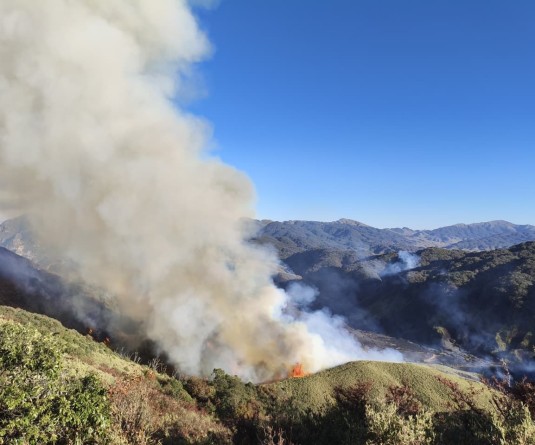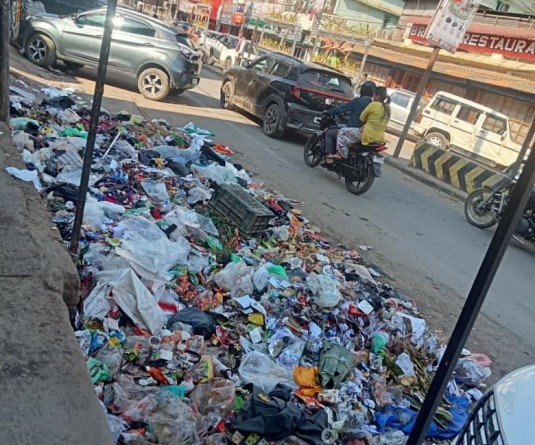Ten captive-bred Asian Giant Tortoise juveniles soft-released into the protected Intanki National Park of Nagaland on December 19. (Photo Courtesy: NZP)

Dimapur, December 19 (MExN): Ten captive-bred Asian Giant Tortoise juveniles soft-released into the protected Intanki National Park of Nagaland becoming the first monitored rewilding of the species in India, the Director, Nagaland Zoological Park informed on Monday.
The Asian Giant Tortoise (Manouria emys phayrei) is the largest tortoise in mainland Asia, listed as ‘critically endangered’ in the IUCN Red List of Threatened Species. The ten released tortoises were bred through Conservation Breeding Programme at Nagaland Zoological Park, Rangapahar.
The Director, Dr C Zupeni Tsanglai informed in a press release that the Nagaland Forest Department (NFD) collaborated with the Turtle Survival Alliance (TSA) and Wildlife Conservation Society India (WCSI for the project. This first monitored rewilding of the Critically Endangered tortoise in India comes after over five years of conservation breeding efforts at Nagaland Zoological Park, Dimapur, while adding that post-release, animal movement and survival monitoring would be performed through telemetry.
Earlier in December last year, ten captive-bred individuals were released in the Matamuhuri valley, Chattogram Hill Tracts of Bangladesh by the TSA and Creative Conservation Alliance. Together the two release events by the partner organisations in India and Bangladesh will produce the necessary scientific information for developing the long-term monitoring and eventual release strategy for species supplementation throughout their historic range in South and Southeast Asia, the press release stated.
According to the press release, a long history of over-exploitation and a general lack of awareness leading to unsustainable use for consumption by local communities have brought the species to the brink of functional extinction warranted rigorous conservation interventions.
As such, “Nagaland Forest Department with the help of stakeholders and partner organisations is committed in long-term programme to restore an ecologically viable population of Asian Giant Tortoise in the state,” the release stated, quoting Nagaland’s Chief Wildlife Warden Vedpal Singh.
Singh is also said to have noted that the pilot release is a major leap towards repopulating the species.
Similarly, Dr Shailendra Singh, Principal Investigator of joint Asian Giant Tortoise Recovery is said to have noted that the release of these ten tortoises is a large step into the population replenishment phase and ‘The exercise will produce first ever baseline information for developing the long term monitoring and eventual release strategy for species supplementation on the regional scale,’ according to the press release.
It further mentioned that head-ways toward replenishing the wild populations via a regional conservation breeding programme were made by the NZP under a joint programme started with TSA in 2017.
In this connection, Director Dr Tsanglai maintained that today, NZP has the highest number of Asian Giant Tortoise population in India holding over 110 successful hatchlings and juveniles with 13 founder adults.
Tracing the recent species donations at northeast Indian zoos, historic habitats and recent indirect evidence on-field, such rewilding events shall be conducted in multiple phases at the most probable habitats achieving eventual reintroduction of the captive reared individuals. Currently in the first phase, “animals will be soft-released for acclimation throughout the winters and allowed to disperse into the forests at the onset of monsoon followed by active tracking by a joint project team,” stated T Aochuba, Director of the Intanki National Park.
Soft-release is described as gradual return of captive raised individuals in the wild.
These ten juveniles were born in 2018, the first batch of the conservation breeding programme at NZP and have an average weight of 2.4 kg. The cohort underwent thorough health examination by a panel of wildlife veterinarians, prior to their release, added Sushmita Kar, Asian Giant Tortoise Project Researcher, in the press release.
This long term Asian Giant Tortoise Population Recovery Programme also engages with target local communities in the priority areas through awareness programmes, and community involvement, for sensitisation against the hunting of released animals, and protection of important habitats, thus strengthening the participatory conservation initiatives and fostering sense of environmental stewardship in the identified sites inhabited by ethnic tribes who have age long tradition of protecting their local habitats as Indigenous Community Conserved Areas (ICCA), it said.
Meanwhile, the release also expressed gratitude to all the team members of the government and non-governmental organisations who were part of the project in various capacities.




.jpg)

